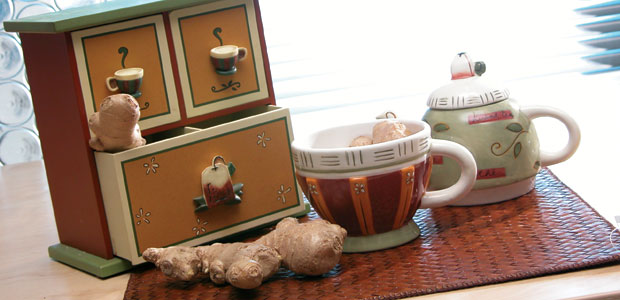Advertisement
Gentle Ginger
As I ran in from the cold, I realized winter was definitely here–and I hadn’t dressed warmly enough. Feeling chilled to the bone, I knew it was the perfect time to make ginger root tea. Drinking ginger root tea on these wintry days is like wrapping yourself in a down comforter. Its warming qualities are … Continued

As I ran in from the cold, I realized winter was definitely here–and I hadn’t dressed warmly enough. Feeling chilled to the bone, I knew it was the perfect time to make ginger root tea.
Drinking ginger root tea on these wintry days is like wrapping yourself in a down comforter. Its warming qualities are both gentle and thorough.
Hot Tea
Ginger root tea is so easy to make. Boil a few slices (two to ten, depending on how strong you want it to taste) of fresh ginger root in a few cups of water for one to three minutes, steep, and drink. I often boil up a four-day supply and keep it in the refrigerator, always heating it before drinking. There are several herbal tea bag varieties and capsule versions on the market that work well, but I prefer the ritual of making tea out of the organic roots I find in the health food store, when available.
Stomach Soother
Ginger (Zingiber spp.) is native to Asia, but it is cultivated throughout the tropics and sold commercially. Ginger’s warming quality is the major reason I recommend it. I also use it to treat a variety of other conditions: The comforting qualities of ginger make it one of the best carminatives, that is, an agent that soothes nausea and cramping, especially in the abdomen, intestines, and uterus. It is often mixed with other herbs in formula to reduce any nausea that may occur from the other herbs.
Ginger works to reduce vomiting and nausea during pregnancy, and in studies it has been shown to be more beneficial than the drug dimenhydrinate in treating motion sickness. Ginger may be preferred to antihistamines for motion sickness, as well, because it does not cause drowsiness. Both tea and capsule forms have been shown to control nausea and vomiting in outpatient surgery and lessen nausea and loss of appetite associated with chemotherapy. Many cases of upset stomach, biliousness, and gas have been cured with simple ginger tea.
A Super Spice
Ginger has also shown anti-ulcer qualities and significant liver-protective activity. The extract of ginger stimulates vasomotor and respiratory centres, lowering both serum and hepatic cholesterol, while inhibiting platelet aggregation. It has good antithrombotic properties, reducing blood clots wherever they are found in the body. The anti-inflammatory activity of ginger is as functional as ASA, without the analgesic activity, and it works effectively to reduce migraines, as well.
Ginger is known to kill some vaginal infections. It also significantly inhibits the growth of bacteria and has antifungal action and anti-rhinoviral activity. The antioxidant effect of ginger, from its constituents gingerol and zingerone, is comparable to synthetic antioxidants. Both gingerol and zingerone have been shown to be strong antioxidants, inhibiting oils from going rancid in the body.
The constituents of ginger have been well studied. The pungent (hot) factor is due to gingerol, shogaols, and related phenolic ketones. Ginger’s oleoresin contains mainly gingerols and shogaols as well as some zingerone. Shogaols and zingerone are dehydration products of gingerol. Also present are small amounts of a proteolytic enzyme called zingibain.
In China, fresh ginger is used clinically for the treatment of rheumatism, acute bacterial dysentry, malaria, and orchitis (inflammation of the testicles). Ginger oil has also been shown to increase immune function at the capillary level.
Ginger has been used as a culinary herb for millennia. There are no reports of toxicity in culinary dosages. As ginger is a mild blood thinner, some physicians suggest that it should not be used when taking pharmaceutical blood thinners. I have not found this to be a problem for dosages at tea or tincture levels, although capsule supplements are much more potent.
It is reassuring that the simple tea I am brewing is beneficial for much more than just its warming qualities. The normal dosage is one to three cups a day (brewed to taste) or one to three supplement capsules, twice daily.




